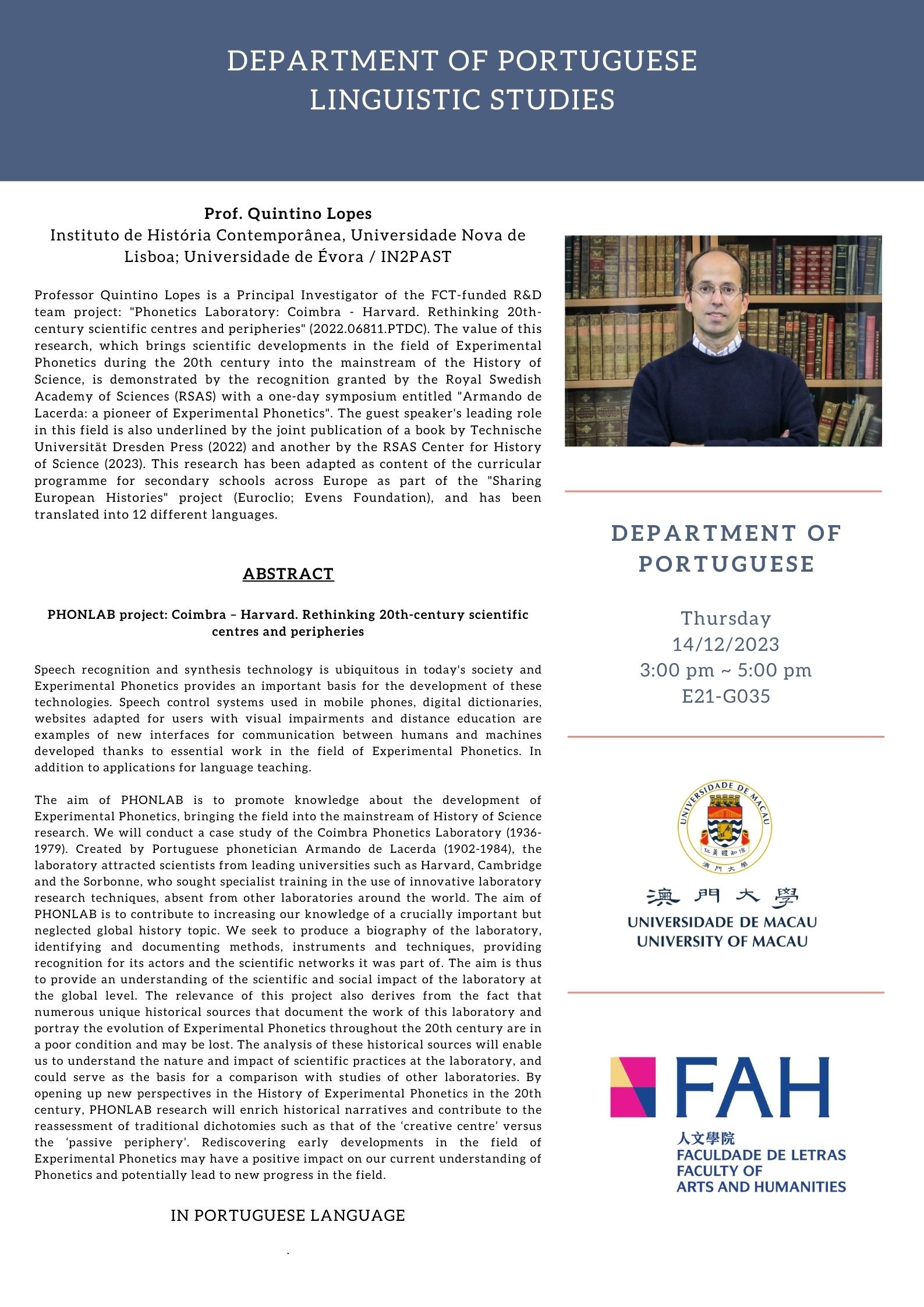

UM-FAH-DPORT: Seminar by Prof. Quintino Lopes on “PHONLAB project: Coimbra – Harvard. Rethinking 20th-century scientific centres and peripheries”
2023-12-14 @ 3:00 pm ~ 5:00 pm
Dear Professors and Students,
We are most pleased to invite all to attend the following Seminar by Prof. Quintino Lopes, from the Instituto de História Contemporânea, Universidade Nova de Lisboa; Universidade de Évora / IN2PAST.
BIO
Professor Quintino Lopes is a Principal Investigator of the FCT-funded R&D team project: “Phonetics Laboratory: Coimbra – Harvard. Rethinking 20th-century scientific centres and peripheries” (2022.06811.PTDC). The value of this research, which brings scientific developments in the field of Experimental Phonetics during the 20th century into the mainstream of the History of Science, is demonstrated by the recognition granted by the Royal Swedish Academy of Sciences (RSAS) with a one-day symposium entitled “Armando de Lacerda: a pioneer of Experimental Phonetics”. The guest speaker’s leading role in this field is also underlined by the joint publication of a book by Technische Universität Dresden Press (2022) and another by the RSAS Center for History of Science (2023). This research has been adapted as content of the curricular programme for secondary schools across Europe as part of the “Sharing European Histories” project (Euroclio; Evens Foundation), and has been translated into 12 different languages.
ABSTRACT
PHONLAB project: Coimbra – Harvard. Rethinking 20th-century scientific centres and peripheries
Speech recognition and synthesis technology is ubiquitous in today’s society and Experimental Phonetics provides an important basis for the development of these technologies. Speech control systems used in mobile phones, digital dictionaries, websites adapted for users with visual impairments and distance education are examples of new interfaces for communication between humans and machines developed thanks to essential work in the field of Experimental Phonetics. In addition to applications for language teaching.
The aim of PHONLAB is to promote knowledge about the development of Experimental Phonetics, bringing the field into the mainstream of History of Science research. We will conduct a case study of the Coimbra Phonetics Laboratory (1936-1979). Created by Portuguese phonetician Armando de Lacerda (1902-1984), the laboratory attracted scientists from leading universities such as Harvard, Cambridge and the Sorbonne, who sought specialist training in the use of innovative laboratory research techniques, absent from other laboratories around the world. The aim of PHONLAB is to contribute to increasing our knowledge of a crucially important but neglected global history topic. We seek to produce a biography of the laboratory, identifying and documenting methods, instruments and techniques, providing recognition for its actors and the scientific networks it was part of. The aim is thus to provide an understanding of the scientific and social impact of the laboratory at the global level. The relevance of this project also derives from the fact that numerous unique historical sources that document the work of this laboratory and portray the evolution of Experimental Phonetics throughout the 20th century are in a poor condition and may be lost. The analysis of these historical sources will enable us to understand the nature and impact of scientific practices at the laboratory, and could serve as the basis for a comparison with studies of other laboratories. By opening up new perspectives in the History of Experimental Phonetics in the 20th century, PHONLAB research will enrich historical narratives and contribute to the reassessment of traditional dichotomies such as that of the ‘creative centre’ versus the ‘passive periphery’. Rediscovering early developments in the field of Experimental Phonetics may have a positive impact on our current understanding of Phonetics and potentially lead to new progress in the field.
IN PORTUGUESE LANGUAGE

